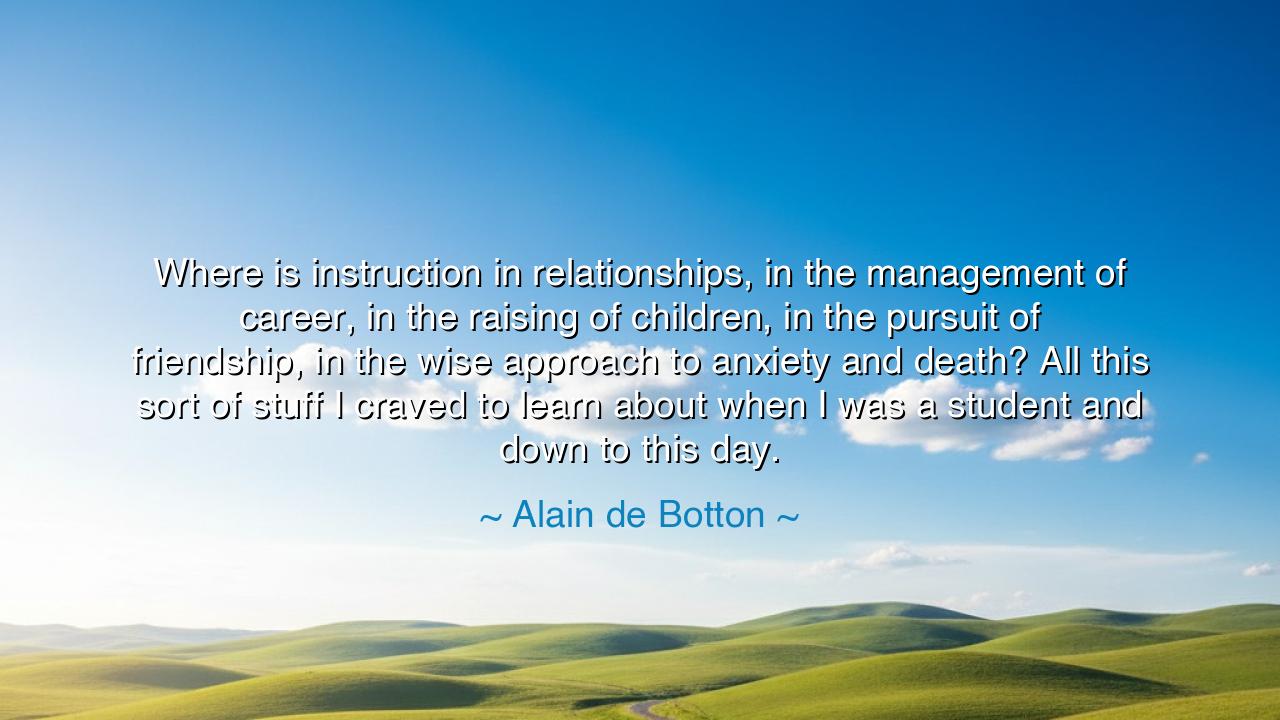
Where is instruction in relationships, in the management of
Where is instruction in relationships, in the management of career, in the raising of children, in the pursuit of friendship, in the wise approach to anxiety and death? All this sort of stuff I craved to learn about when I was a student and down to this day.






In his reflection, Alain de Botton asks the haunting question: “Where is instruction in relationships, in the management of career, in the raising of children, in the pursuit of friendship, in the wise approach to anxiety and death?” This cry is not born of rebellion but of longing — the yearning of a soul that sees how much of life’s true curriculum is left untaught. In schools and universities, we learn the movements of planets and the logic of numbers, but not the movements of the heart. We are taught how to construct arguments, yet not how to build enduring love, raise a soul, or die with peace. De Botton’s words echo through the chambers of modern civilization as both an indictment and a plea — that wisdom must return to its rightful place as the central teacher of life.
The origin of this quote lies in de Botton’s lifelong pursuit of philosophy as therapy, a revival of the ancient idea that learning is not merely to sharpen intellect but to heal the spirit. The Greek philosophers — Socrates, Epicurus, Seneca — did not lecture for examinations or honors. They spoke to guide human beings through fear, loss, ambition, and death. But somewhere in the march of centuries, education became mechanical, and the wisdom of living was cast aside. De Botton’s lament is thus the voice of one calling from the ruins, asking why we have forgotten to teach what truly sustains the heart.
There is an old story that mirrors his question — that of Marcus Aurelius, emperor and philosopher. Though he ruled the greatest empire of his time, his teachers had not prepared him for grief, betrayal, or the weight of mortality. So he taught himself. In his Meditations, written by candlelight in military camps, he wrote, “Waste no more time arguing about what a good man should be. Be one.” There was no instruction manual for life, so he became his own. His example reveals the same truth that de Botton grieves: that we must reclaim the wisdom of living, or else be doomed to power without peace, and learning without purpose.
When Alain de Botton speaks of craving instruction in relationships, friendship, anxiety, and death, he speaks for millions who have achieved knowledge but not serenity. The modern mind, overfed with information, remains malnourished in wisdom. We are experts at communication, yet struggle to understand one another. We can engineer cities that touch the clouds, yet cannot still the storm within our minds. De Botton reminds us that the greatest education is not found in the mastery of systems, but in the governing of the self — in learning how to love, endure, forgive, and hope.
His lament is also a call to action — to rebuild the temple of learning upon foundations of humanity. Imagine if our schools taught not only literature, but also how to apologize; not only history, but also how to grieve; not only economics, but also how to live without envy. Imagine if our classrooms echoed with lessons on friendship as sacred art, or on death as a teacher of humility. Such an education would raise not only scholars, but whole human beings, capable of compassion and courage in a fractured age.
In the story of Viktor Frankl, who endured the concentration camps of the Second World War, we find an embodiment of de Botton’s vision. Frankl had studied medicine and psychology, but it was in the midst of horror that he found the real curriculum of the soul — the discovery that meaning can outlast suffering. His later work, Man’s Search for Meaning, became a beacon for millions because it taught what no university course had offered: that to live is to find purpose even amid despair. This, too, is what de Botton hungers for — an education not of grades, but of grace.
Thus, the meaning of the quote is not only a critique but a summons — to restore wisdom, empathy, and self-understanding to their rightful place in the human journey. For without instruction in the art of being human, even the brightest intellect will stumble in the dark. Knowledge may build bridges and machines, but wisdom builds peace within the heart. The ancients knew this; modernity must remember it.
The lesson is simple, yet eternal: seek education that shapes both mind and spirit. Do not be content with facts — hunger for understanding. Read not only to know, but to live well. In practical terms, let every person become both student and teacher in the school of life. Study philosophy not for argument, but for healing. Practice patience as one would practice art. Reflect daily on love, friendship, and mortality — for these are the true examinations of the soul. When we learn these things, as Alain de Botton longed to, we do not merely grow — we awaken.






AAdministratorAdministrator
Welcome, honored guests. Please leave a comment, we will respond soon